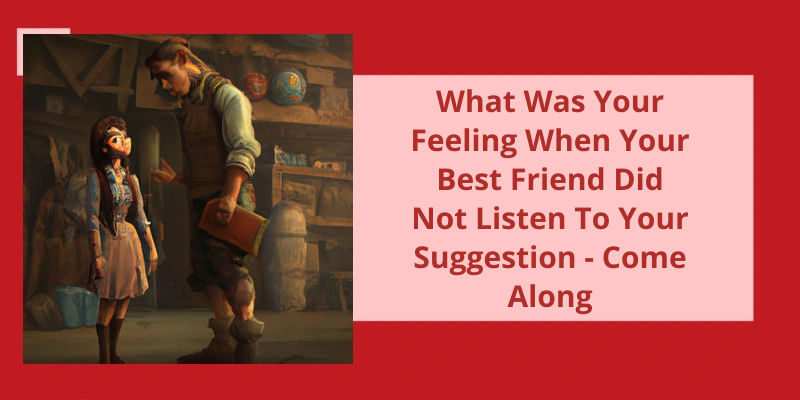Our closest friends are often the ones we turn to for advice, guidance, and support. When they disregard our suggestions, it can evoke a range of emotions. One such instance is when your best friend doesn’t listen to your suggestion to "come along." The feeling that arises in such a situation is multifaceted and can be influenced by various factors such as the context, the nature of the suggestion, and the strength of the friendship. It’s essential to delve into the depths of this emotional response to understand the underlying motives and navigate the path towards resolving any potential conflicts that may arise.
What to Do if Your Best Friend Is Not Giving You Attention?
When your best friend doesn’t listen to your suggestions and fails to acknowledge your inputs, it can be disheartening. The feeling of being ignored or undervalued can leave you questioning the strength of your friendship. However, it’s important to approach this situation with maturity and a genuine desire to understand and communicate.
Firstly, consider engaging with your friend in a different way. Sometimes, people respond better to alternative methods of communication. If you typically provide suggestions verbally, try writing them down or showing visual aids to illustrate your point. By changing your approach, you may capture your friends attention in a way that resonates with them.
Alternatively, giving your friend some space might also be beneficial for both of you. Sometimes, individuals need time for personal reflection or to address other aspects of their lives. By giving them space, you allow them to refocus their energy and potentially return with a fresh perspective. Remember, friendships aren’t solely based on constant attention, but also on mutual understanding and support.
If your friends lack of attention persists despite your best efforts, it may be necessary to reevaluate the friendship. Consider whether this pattern of behavior is consistent and whether it aligns with the values you seek in a friendship. Remember, healthy friendships involve mutual respect, open communication, and active listening.
It’s essential to have honest conversations with your friend about how their behavior impacts you. Approach the discussion with empathy and a genuine desire to understand their perspective. They may not be aware of the impact their actions have on you, and this conversation could shed light on the issue and pave the way for change.
Lastly, take care of yourself in this process. It’s natural to feel disappointed or frustrated when your best friend doesn’t listen to you. Seek support from other friends or loved ones who can provide guidance and reassurance. Remember that you deserve to have a supportive and attentive friend who values your input.
How to Navigate Conflicts and Disagreements in a Friendship
Having conflicts and disagreements in a friendship is completely normal and can actually strengthen the bond between friends if approached in a healthy way. When your best friend doesn’t listen to your suggestions, it can be frustrating and hurtful. However, it’s important to recognize that everyone has their own perspective and it’s not always easy to see eye to eye. Here are some tips for navigating conflicts and disagreements in a friendship:
1. Communication is key: Talk openly and honestly about your feelings and concerns with your friend. Avoid getting defensive or confrontational, and instead, try to have a calm and respectful conversation.
2. Choose the right time and place: It’s important to pick the right moment to discuss the issue. Find a time when both of you’re relaxed and not in a rush. Also, choose a private and quiet environment where you can have an uninterrupted conversation.
3. Active listening: When your friend is explaining their point of view, be sure to actively listen without interrupting. This shows that you value their perspective and creates a space for open dialogue.
4. Find common ground: Look for areas of agreement and understanding. By focusing on shared interests and values, you can come to a compromise that satisfies both parties.
5. Be open to compromise: Understand that friendships require give and take. Be willing to find a middle ground or alternative solutions that can address both your needs.
6. Respect boundaries: It’s important to respect each other’s boundaries and individuality. Allow your friend to have their own opinions and choices, even if they differ from yours.
7. Apologize and forgive: If you’ve made a mistake or said something hurtful during the conflict, be willing to apologize. Similarly, if your friend apologizes, be open to forgiveness and moving forward.
Remember that friendships are built on trust, understanding, and acceptance. By effectively navigating conflicts and disagreements, you can strengthen your friendship and grow together.
It can be frustrating when someone doesn’t listen to your advice, but before getting too disheartened, it’s important to consider whether they actually wanted your input in the first place. Unsolicited advice, no matter how well-intentioned, is often disregarded, especially if the person feels like their boundaries are being crossed.
What to Do When Someone Doesn T Listen to Your Advice?
It can be disheartening when your best friend doesn’t listen to your suggestion, especially if you genuinely believe it could benefit them. In such situations, it’s important to take a step back and reflect on the dynamics of your relationship. Ask yourself if your friend actually sought your input or if you offered it unsolicited. Unsolicited advice is often disregarded, as the recipient may feel that you’re overstepping boundaries.
If your friend didnt actively seek your advice, it may be best to reconsider your approach. Instead of pushing your ideas onto them, be patient and wait for them to express a need for guidance. This will ensure that your suggestions are more likely to be considered and respected.
However, it’s crucial to remember that everyone has the right to make their own decisions, even if they may not align with your advice. Ultimately, your role as a friend is to support them, even when you disagree. Instead of becoming frustrated, focus on understanding their perspective and respecting their autonomy.
Lastly, keep in mind that relationships are built on trust and mutual understanding. If your friend consistently ignores your input, it may be worth having an open and honest conversation with them. Express your concerns and feelings, and try to understand why they’re hesitant to listen to you. By fostering open communication, you can work together to strengthen your friendship and find common ground when it comes to offering and receiving advice.
How to Communicate Effectively With a Friend Who Doesn’t Listen to Your Advice
- Listen attentively to their concerns and opinions
- Show empathy and understanding
- Avoid interrupting or criticizing their thoughts
- Respect their autonomy and choices
- Find common ground or shared experiences to relate to
- Ask open-ended questions to encourage dialogue
- Validate their emotions and feelings
- Suggest alternatives or different perspectives gently
- Provide examples or personal experiences to support your advice
- Offer to collaborate or find compromises together
- Be patient and give them time to process the information
- Reassure them that you genuinely care and have their best interests at heart
Source: What should I do if someone won’t listen to my advice?..
Conclusion
In conclusion, the experience of having a best friend who doesn’t listen to your suggestion to come along can evoke a complex mix of emotions. From disappointment and frustration to hurt and betrayal, it’s natural to feel a range of reactions when someone we trust disregards our advice. It’s important to remember that despite our best intentions, we can’t control the choices and actions of others. Instead, we must focus on maintaining open lines of communication, understanding each other's perspectives, and accepting that sometimes people make choices that don’t align with our own. Ultimately, learning to navigate these situations with empathy and compassion can strengthen our friendships and help us grow as individuals.






